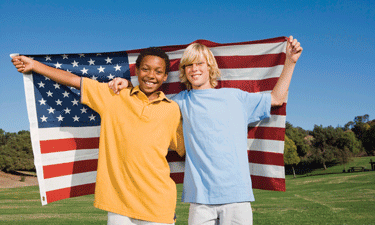 July is a special time of year for people in the United States. A few short days into the month, we celebrate the independence of our nation with fireworks, picnics and more. As summer really begins to sizzle, many people spend more time outside than they do during the rest of the year. Families take vacations, kids are out of school and outdoor recreation is big business. Summer is special for parks and recreation professionals because exciting outdoor programming is underway and participation is at its peak.
July is a special time of year for people in the United States. A few short days into the month, we celebrate the independence of our nation with fireworks, picnics and more. As summer really begins to sizzle, many people spend more time outside than they do during the rest of the year. Families take vacations, kids are out of school and outdoor recreation is big business. Summer is special for parks and recreation professionals because exciting outdoor programming is underway and participation is at its peak.
While news and research indicates children are spending less and less time outside, the summer months serve as an exception to this modern rule. Outdoor recreation is in high gear for youth whether at swimming pools, backyards, summer camps or parks. Summer is often the time many kids begin to cultivate their connection to nature and the many vast open green spaces the United States has to offer.
While the physiological, psychological and social benefits of kids being outside are well documented, an additional benefit is perhaps overlooked. Getting our children outdoors and engaged with nature creates a connection to our national values and practice of preserving sacred places. A short moment spent reminiscing about childhood summers probably recalls memories of picnics, smells of cut grass and ice cream. It is important to also consider, however, where these memorable moments took place. These authors would venture to guess many readers’ special memories are set in backyards, local lakes, forests, swimming pools and parks — scared places.
As the pinnacle celebration of patriotism gears up, we must ask ourselves: Are we cultivating a sense of why this land is so dear to us, and are we passing that along to new generations?
There is no doubt outdoor recreation improves a child’s well-being, but it is also vital in creating a sense of pride, stewardship and gratuity for our natural spaces. Taking children to America’s sacred places provides an opportunity to recreate outdoors and a chance to understand how these historical, cultural and/or natural areas define what America was, is and can be.
These unique places preserve the essence of America and are special to each of us. It is time for park and recreation professionals to add another justification for getting our nation’s youth outdoors — children need outdoor recreation experiences to help develop their sense of national pride.
Outdoor recreation may look differently than it did in decades past, but changing times do not erase the importance of preserving and promoting these special places to our children. While debates related to technology in outdoor recreation, programmed versus unprogrammed experiences, and free-range versus supervised recreation continue, the simple act of getting children outside moves beyond these arguments.
Recently a friend asked, “Aren’t you afraid of the priorities of the selfie generation?” Not at all. When youth take “selfies” at park sites or during recreation, they are indicating the importance of that experience or place. A quick flip through a person’s photo collections will reveal their priorities in life and serve as a slideshow of things they hold dear. Instead of lamenting the priorities of today’s youth, perhaps we ought to ask, “Are we ensuring future generations have the opportunity to visit grand national spaces that inspire the taking of a selfie?”
During a recent speaking engagement, Dr. Carolyn Ward of the Blueridge Parkway Foundation may have communicated the best philosophy regarding connecting kids to nature. Ward made it clear that the focus should not be on how our children experience these wonderful places and interact with nature, history and culture. The focus should be on the simple fact they are experiencing all of those things at all, not to mention developing deeper connections to America’s sacred natural spaces in their own way. In time, these same children may look to visceral, physical interactions with nature as a welcome respite from technology’s growing influence.
As summer continues and so many of us head outside, remember to embrace whatever way your children choose to connect to this great nation and the wonderful parks, green spaces and activities we all hold dear. The health benefits are essential for these children, but building that sense of place is also critical for the future of our nation, its communities and its sacred places.
Michael J. Bradley, Ph.D., is an Assistant Professor in the Department of Recreation and Park Administration at Eastern Kentucky University. Jody M. Baker is the Activities Director for Tulsa County Parks in Tulsa, Oklahoma.

